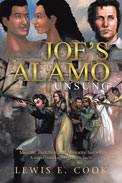
 |
Rosana is the lovely and eligible youngest daughter of wealthy plantation owners Phillip and Rosemary Cato. To young schoolteacher William Travis, she seems like the perfect potential wife. Anxious to please his new in-laws, William begins to print a newspaper, a job he hates. But flirtatious Rosana is more experienced with men than any debutante should be. Marriage and motherhood soon bore her, and she has an affair. William must flee after killing a man in a case of self-defense related to Rosana's honor after a dalliance leaves her pregnant for the second time.
Taking Joe, his slave, William escapes to Texas, a territory of Mexico whose people struggle, as he does, to start over. Texans want membership in the United States and are willing to send Mexico, which only gained its independence from Spain recently, into another war. William fares better than most as he left teaching for the law. He prospered in Alabama, and now his expertise lets him advocate for Texans who are easy marks for swindlers. Here, his fighting spirit serves him well, as he and other historical figures like Jim Bowie and Davy Crockett engage in the battle at the Alamo.
William breaks the law by teaching Joe to read. But he never learns that Joe has secretly married Rosana's slave woman, Emily. Though they only rarely meet after that, they remain faithful to each other. Seeking a divorce, Rosana pursues William to Texas, bringing Emily along. Emily resists the lechery of white men even to the point of attempting suicide, saving her virginity for Joe. Alone, she embarks on a risky search for him. Do heartbreaking rumors from the Alamo mean she faced those perils in vain?
Cook, an attorney, shows William Travis practicing law as it was before the Civil War. He writes knowledgeably about General Sam Houston and even lives in the city named for him. In addition to blacks, his novel also features Native American characters as well as those from the Middle East and Asia. Some of these are even practicing Buddhists and Muslims. Indeed, though some books about the Alamo fleetingly mention the presence of blacks at the battle, this one is unique in its reference to the participation of members of other races and religions. Cook also extensively researched the contributions of such participants as Susana Dickinson and a previously unnamed slave who died and was recently identified as John.
The novel's female characters take an unusual view of marriage and women's roles. No one knows why the Travis' marriage failed, so Rosana's infidelity is Cook's best guess. Interestingly, Rosana's promiscuity does not result in ostracism, and William suffers for it more than she does. However, in keeping with what was often the cultural norm of the time, Emily, Rosana, and Susana all marry young. Susana and Rosana are in their teens, and Emily is eleven. Emily is rare, though, among slave wives as she manages to avoid sex with any man but Joe. At the Alamo, Susana steps with her husband across the line that William draws in the sand when he asks who will fight. Susana reloads and shoots guns alongside the men. After the battle, she shouts, "Remember the Alamo!" at her conquerors.
This is a book for anyone curious about the possible experiences of obscure historical figures. It may also acquire a readership among those interested in women's daily lives in various segments of early nineteenth-century American society. Like Robert Brightwell's Flashman at the Alamo, it features a protagonist who leaves home to distance himself from scandal. It also shares its presentation of little-known facts about certain historical figures with Forget the Alamo! by Drew McGunn. This story illustrates the lessons one may learn from those who face defeat with dignity.